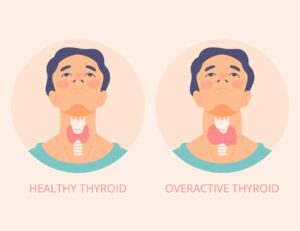Thyroid
What is Thyroid Disease
Are you constantly feeling fatigued, experiencing unexplained weight gain or weight loss, dry skin, and erratic mood swings? If the answer to that is yes, then you are likely to have been experiencing symptoms of a Thyroid disorder, which generally overlap with those of normal life variations or of any other unrelated health issues, that often go undiagnosed or are misdiagnosed. Thyroid disorders are on the rise, and this article aims to promote awareness and understanding of Thyroid health.
The Butterfly-shaped Thyroid gland is responsible for producing Thyroid hormones, which are essential for growth, development, reproduction, and regulation of energy metabolism. When the Thyroid gland makes either too little or too much of these hormones, it’s called a Thyroid disease. The different types of Thyroid disease include Hyperthyroidism, Hypothyroidism, Thyroiditis, Hashimoto’s Thyroiditis, Thyroid nodules, and Thyroid cancer, with potentially devastating health consequences if left untreated, that affect all populations worldwide.
Managing Thyroid disorders often involves a multifaceted approach, and one important aspect is Thyroid diet. A well-balanced Thyroid diet can play a crucial role in supporting thyroid management. It’s essential to incorporate foods rich in iodine, selenium, and zinc into your diet as these minerals are vital for Thyroid function. Additionally, foods like leafy greens, seafood, and nuts can be beneficial for your thyroid health.
Understanding the connection between a Thyroid diet and thyroid management is key to achieving optimal health.
Need to consult?
Quickly Book an Appointment.

Types of Thyroid Diseases
- Hypothyroidism (Underactive Thyroid): Hypothyroidism is arguably one of the most common and undiagnosed endocrine health disorders suffered by the population worldwide. This condition is twice as prevalent in women as compared to men and is very commonly seen among women of childbearing age. Managing hypothyroidism diet, which focuses on nourishing the thyroid and optimizing hormone levels. This diet typically includes foods rich in iodine, selenium, and zinc, as well as avoiding goitrogenic foods that can interfere with thyroid function.
Hypothyroidism is caused due to an underactive Thyroid gland resulting in a deficient secretion of Thyroid hormones affecting basic bodily functions such as breathing, digestion, weight, heart rate, and mood swings. It’s important for individuals with hypothyroidism to work closely with a healthcare professional to develop a personalized hypothyroidism diet plan that supports their overall well-being.
- Thyroiditis (Inflammation of the Thyroid gland): Thyroiditis can significantly reduce the amount of hormones that your thyroid produces. The most common cause of Thyroiditis is Hashimoto’s Thyroiditis. Managing thyroiditis often involves dietary considerations, similar to those for hypothyroidism, to support thyroid health and reduce inflammation.
- Hashimoto’s thyroiditis: It is an autoimmune disease condition and is the most common cause of Hypothyroidism. It is an inherited medical condition wherein the body’s own cells attack and damage the thyroid gland. People with Hashimoto’s thyroiditis may benefit from both a hypothyroidism diet and an anti-inflammatory diet, as reducing inflammation can help manage the autoimmune response.
Hashimoto’s Thyroiditis can also cause Subclinical Hypothyroidism in which the Hypothyroidism has not progressed far, depicting few or almost no symptoms. In such cases, dietary interventions can play a crucial role in preventing the progression of symptoms.
- Hyperthyroidism (Overactive Thyroid): Hyperthyroidism occurs when the Thyroid gland makes too much of the Thyroid hormones (T3, T4 or both). When the Thyroid gland produces too much of the Thyroid hormones, all of the bodily functions speed up, as a result of which, you can experience several physical symptoms. A hyperthyroidism diet is essential for individuals with this condition, as it aims to limit the intake of iodine and other thyroid-stimulating nutrients to help regulate hormone production.
However, with diagnosis and proper treatment of the underlying cause, symptoms, and the consequent complications of hyperthyroidism can be relieved or prevented. In addition to medical treatment, dietary adjustments can be beneficial in managing this condition.
- Thyroid nodules: Thyroid nodules, like any other nodules, are characterized by solid or fluid-filled lumps in the Thyroid gland at the base of the neck. Most of the Thyroid nodules generally don’t produce any symptoms and may possibly not require any treatment. However, for those that are larger or are cancerous nodules (that can be felt or seen as visible lumps at the base of the neck and produce blatant symptoms), treatment options like medications or surgical removal methods are available.
- Thyroid Cancer: Thyroid cancer is more commonly diagnosed among adult women as compared to in men and youth. About 2/3 of cases occur in people aged 55 years. There are different kinds of thyroid cancers, causes of which are poorly understood. Combinations of genetic and environmental factors are speculated to be the causative factors. Most Thyroid cancer cases have a good prognosis and generally high survival rates, especially if diagnosed during the early stages. Treatment for thyroid cancer often involves surgical removal of the thyroid gland, followed by thyroid hormone replacement therapy, and dietary recommendations may be given to support overall health and well-being during and after treatment.
Causes
Causes of Hypothyroidism
Hypothyroidism may be caused due to a number of factors, including:
Primary Hypothyroidism: Development of Hypothyroidism due to primary failure of the Thyroid gland itself.
- Congenital and Neonatal Hypothyroidism: Around 1 out of every 4,000 babies is born with either congenital or neonatal Hypothyroidism.
In congenital hypothyroidism, the baby is born without a thyroid gland whereas In neonatal hypothyroidism, the baby is born with a normal functioning thyroid gland, but then later develops symptoms of hypothyroidism (Post its first twenty-eight days of life). If left untreated, the child could develop both physical and mental issues such as brain damage and developmental impairment. Therefore, neonatal screening for Hypothyroidism in newborns has been made mandatory as the standard practise of care worldwide.
- Thyroiditis(Inflammation of the Thyroid gland)
- Hashimoto’s thyroiditis
- Postpartum thyroiditis: It’s usually a temporary condition which occurs in 5% to 9% of women after childbirth.
- Iatrogenic Hypothyroidism (meaning “Doctor caused This can result from surgical removal of Thyroid gland, receiving radiation therapy used to treating cancers of head and neck and receiving radioactive iodine therapy for ablation of Thyroid gland which may all lead to and cause Hypothyroidism.
- Drug Interactions: Certain drugs such as lithium used to manage Bi-poalr disorders can trigger Hashimoto’s induced hypothyroidism.
Secondary Hypothyroidism
- Pituitary problems: This is a relatively rare cause of Hypothyroidism which interferes with the production of TSH (Thyroid stimulating hormone) that is caused due to the presence of tumours or cysts on the pituitary gland which interfere with the production of hormones from the adrenal glands and gonads leading to thyroid hormone imbalance.
Tertiary Hypothyroidism
- Hypothalamus problems: Relatively rare cause of Hypothyroidism which can occur due to a trauma injuring the Hypothalamus or due to growth of a malignant tumor in that region.
- Iodine Deficiency: The trace mineral Iodine is essential for the production of Thyroid hormones which is found primarily as seaweed, seafood, iodised salt and plants grown in iodine rich soil. Without adequate iodine, the thyroid gland cannot produce enough thyroid hormones leading to overstimulation by the pituitary gland to produce TSH causing the enlargement of the Thyroid gland, known as
- Goitrogens: Goitrogens are described as chemicals that often interfere with or block the iodine absorption causing the formation of Goiter. The different dietary sources of goitrogens include cruciferous vegetables such as Cabbage, Cauliflower, Radish, Sweet Potatoes, millets etc.
Causes of Hyperthyroidism
Hyperthyroidism may be caused due to a number of factors, including:
- Grave’s Disease (Autoimmune disorder) :This is the most common cause of Hyperthyroidism resulting in the antibodies to over stimulate the Thyroid gland to produce more hormones.
- Excess Iodine consumption
- Thyroiditis
- Tumorsof Ovaries, Testes, Thyroid or Pituitary gland
Risk Factors
Risk factors for Hypothyroidism
Anyone can develop Hypothyroidism, but, you are at an increased risk if you:
- Have a family history of thyroid disease conditions
- Are a woman
- Women over forty
- Have been pregnant or have delivered a baby within the past five to six months
- Have been diagnosed with premature ovarian failure, premature menopause or early menopause
- Anyone over the age of 60
- Have an autoimmune disease, such as type 1 diabetes, Rheumatoid Arthritis, Lupus or celiac disease
- Have symptoms of depression (particularly postpartum depression) or who has been recently diagnosed with depression
- Have been treated with radioactive iodine or anti-thyroid medications
- Received radiation to your upper chest or neck
- Have had thyroid surgery (partial thyroidectomy)
Risk factors for Hyperthyroidism
Anyone can develop Hyperthyroidism, but, you are at an increased risk if you :
- A family history in particular, of Graves’ disease
- Have a history of a thyroid condition in the past or are being treated for hypothyroidism
- Are a woman
- Have been pregnant or have delivered a baby within the past five to six months
- Are between the ages of 20 and 40
- Have a personal history of any other chronic autoimmune illness such as Addison’s disease, type 1 diabetes, rheumatoid arthritis and Lupus
- Have vitiligo (pigmentation loss)
Symptoms
Symptoms of Hypothyroidism
There are varying signs and symptoms of Hypothyroidism depending on the severity of hormone deficiency. These symptoms often tend to develop slowly over the course of years.
The signs and symptoms of Hypothyroidism are:
- Cardiovascular changes: Such as slowed heart rate, elevated blood pressure, elevated cholesterol levels, shortness of breath, calf pain, muscle ache, tenderness and stiffness.
- Cold intolerances
- Depression
- Digestive changes and weight gain: Constipation, bloating, flatulence, heartburn, poor appetite and weight gain due to slowed metabolism.
- Fatigue and sleepiness
- Hair changes: Thinning of hair, texture changes (hair loses its sheen, becomes dull), loss of body hair such as eyebrows, arm and leg hair, and also pubic hair.
- Skin changes: Dry, coarse and cracked skin
- Fingernails: become brittle
- Menstrual cycle changes: Periods become heavier and more frequent than usual, anaemia may also develop, irregular periods and difficulty in conception, can be a causative factor of infertility.
- Poor memory and concentration
- Voice changes: hoarse or husky voice
- Face changes: Puffiness, swollen eyelids, pale and porcelain like skin
- Enlarged Thyroid gland (Goitre)
Symptoms of Hyperthyroidism
Hyperthyroidism can cause a wide variety of signs and symptoms such as :
- Behavioral and Emotional changes: Irritability, restlessness, anxiety, depression, sleeplessness and general sadness.
- Bowel movements and appetite: Increased frequency of bowel movements, increased appetite, sweet cravings, unexplained weight loss due to increased metabolism
- Easy bruising
- Exhaustion
- Eye problems: Protrusion of eyeballs, swelling of skin around the eyes, double vision and inability to tolerate bright lights.
- Hair changes: Fine and Brittle hair
- Skin changes: Fine, silky texture
- Heart palpitations
- Heat intolerance
- Infertility
- Menstrual cycle changes: May skip periods, they are scantier and lighter
- Muscle weakness
- Decreased sexual function and Libido
- Tremors
- Unexplained weight loss
Diagnosis of Thyroid diseases
Thyroid diseases can be difficult to diagnose because of similarly occurring symptoms easily confused with those of other disease conditions. The most important step in diagnosing Hypothyroidism, Hyperthyroidism and other Thyroid diseases is to screen those who are vulnerable to developing Thyroid diseases and if you exhibit 4 or more symptoms of the Thyroid ailments as discussed earlier.
The tests that can help diagnose you with Thyroid diseases especially Hypothyroidism and Hyperthyroidism are:
- Blood tests
- Imaging tests
- Physical examination
Blood tests
- TSH (Thyroid stimulating hormone): Hypothyroidism is associated with an elevated TSH level whereas Hyperthyroidism is associated with a low TSH level.
Normal TSH range for an adult is between 0.40 – 4.50 mIU/mL
- T4: Thyroxine: In case of Hypothyroidism, there are lower levels of T4 hormone whereas in Hyperthyroidism, higher levels of T4 may be indicative of the disorder.
Normal T4 range for an adult is between 5.0 – 11.0 ug/dL
- T3: Triiodothyronine: Low T3 levels are observed in case of hypothyroidism, whereas T3 levels are elevated in case of Hyperthyroidism.
Normal T3 range is between 100 – 200 ng/dL
These tests alone may only help in prompting your healthcare provider to carry out further testing in order to evaluate and ultimately diagnose a possible thyroid disorder.
These tests include:
- Thyroid Antibodies
- Calcitonin
- Thyroid Globulins
Imaging tests
Imaging tests allow your health care provider to look at your thyroid gland and check for an increased size, changed shape or any growths (nodules).
These include:
- Thyroid scan
- Ultrasound
Physical examination
In this method, your health care provider simply feels your neck to check for any enlargement of or growths on thyroid gland.
Treatment and Management of Thyroid diseases
The main goal behind the treatment approach for any Thyroid disease is to return your thyroid hormone levels back to normal.
If you suffer from Hypothyroid, the main treatment option is:
- Thyroid Hormone replacement therapy: The goal of this replacement therapy is to restore your TSH levels back to normal through administration of a synthetic drug. Levothyroxine is the most common medication used to control Hypothyroidism.
If you suffer from Hyperthyroidism, the main treatment options are:
- Antithyroid drugs: These medications help regulate your thyroid gland by stopping the excess production of Thyroid hormones.
- Radioactive iodine: This treatment prevents the excess production of Thyroid hormones by damaging the cells of the Thyroid gland.
- Beta blockers: These medications help in managing the symptoms.
- Surgery: It is a permanent form of treatment which helps to stop the production of Thyroid hormones. This form of treatment however would require you to take Thyroid replacement hormones for the rest of your life.
Apart from the above mentioned treatments, lifestyle and dietary changes are necessary to lead a healthier life. Intake of certain essential nutrients along with adequate administration of medications can help manage your Thyroid disorders better.
Food & Wellness | Thyroid Management Programme
At Food & Wellness, our thyroid diet nutritionists prepare the diet plans are tailor made and customised by an expert panel of Nutritionists to ensure that the progression of the above existing medical conditions are slowed down and overall health parameters are gradually improved over the course of time.
In detail discussion of your Dietary and lifestyle habits along with scientific analysis of blood reports is done to further support the holistic management and treatment of disease ailments.
Through the Thyroid Disease management program, we aim to positively improve the Thyroid Disease profile by significantly decreasing the initial body weight, providing necessary dietary and supplementary suggestions to improve nutrient profiles, through provision of easy to follow and flexible dietary and lifestyle recommendations with key emphasis on suggesting a variety of food options to break the cycle of meal monotony.
The treatment strategy is carefully customised according to the severity of the client’s symptoms. The main aim of the treatment is to achieve optimal normal serum levels of the Thyroid stimulating hormone (TSH) and signs and symptoms management.
Post conclusion of the program, Maintenance diet plans are assigned to encourage adoption of healthy eating principles and of inculcating a nourishing and healthy lifestyle, all of which are taught during the course of the program.
This advocates and ensures that the individual remains healthy throughout life.
To know more on how to manage your Thyroid disorders, subscribe to Food & Wellness blog today!

Let's get started with treating your condition...
At Food & Wellness we believe that every individual is different and needs special attention. We adapt our programme to your existing lifestyle and try not to change anything drastically so you can easily transition. Over a period of time we ensure results and help you restore your health.
Thyroid Articles

Magnesium & Fertility: Why This Mighty Mineral Matters for Reproductive Health
Magnesium is a fertility powerhouse—balancing hormones, boosting ovulation, and improving sperm health. Yet, 50% of adults are deficient! Discover how this “master mineral” enhances conception, top food sources, and smart supplementation tips backed by the latest research.

Nutritional principles and recommendations in thyroid diseases
Managing thyroid disease through nutrition is crucial for supporting thyroid function and alleviating symptoms. This blog explores the role of key nutrients like iodine, selenium, zinc, and vitamin D, along with dietary recommendations for conditions like hypothyroidism, hyperthyroidism, Hashimoto’s, and Graves’ disease. Learn how balanced nutrition can improve thyroid health and overall well-being.

Thyroid Disorders and Infertility: How They’re Connected
Thyroid disorders and infertility are intricately connected, and understanding this relationship is crucial for anyone facing challenges in conceiving. The thyroid gland, responsible for regulating hormones that control metabolism, energy levels, and overall bodily functions, plays a significant role in reproductive health.
